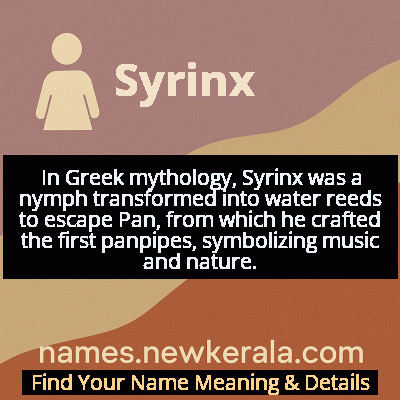Syrinx Name Meaning & Details
Origin, Popularity, Numerology Analysis & Name Meaning of Syrinx
Discover the origin, meaning, and cultural significance of the name SYRINX. Delve into its historical roots and explore the lasting impact it has had on communities and traditions.
Name
Syrinx
Gender
Female
Origin
Greek
Lucky Number
1
Meaning of the Name - Syrinx
In Greek mythology, Syrinx was a nymph transformed into water reeds to escape Pan, from which he crafted the first panpipes, symbolizing music and nature.
Syrinx - Complete Numerology Analysis
Your Numerology Number
Based on Pythagorean Numerology System
Ruling Planet
Sun
Positive Nature
Leaders, ambitious, highly driven, self-reliant, innovative.
Negative Traits
Overly aggressive, domineering, impatient, selfish.
Lucky Colours
Red, orange, gold.
Lucky Days
Sunday.
Lucky Stones
Ruby, garnet.
Harmony Numbers
2, 3, 9.
Best Suited Professions
Entrepreneurs, managers, engineers.
What People Like About You
Courage, determination, leadership.
Famous People Named Syrinx
Syrinx (Mythological)
Naiad Nymph
Transformed into water reeds to escape Pan, inspiring creation of pan pipes
Syrinx (Literary Character)
Mythological Figure
Featured in Ovid's Metamorphoses and Renaissance literature as symbol of chastity
Syrinx (Musical Inspiration)
Mythological Muse
Inspiration for Debussy's landmark flute composition 'Syrinx'
Syrinx (Scientific Term)
Biological Reference
Namesake for avian vocal organ enabling complex bird songs
Name Variations & International Equivalents
Click on blue names to explore their detailed meanings. Gray names with will be available soon.
Cultural & Historical Significance
During the Renaissance and Baroque periods, Syrinx experienced a cultural revival as artists and musicians rediscovered classical themes. She became a popular subject in paintings, often depicted at the moment of her transformation, and inspired numerous musical compositions. The story's themes of unattainable beauty and artistic creation resonated particularly during the Romantic era, when artists celebrated nature and emotional expression. In modern times, Syrinx continues to influence culture through scientific terminology (the avian syrinx), literary references, and as a symbol of natural purity and artistic inspiration, maintaining her relevance across more than two millennia of Western cultural development.
Extended Personality Analysis
The name Syrinx evokes personality traits deeply connected to its mythological origins, suggesting an individual who is creative, nature-oriented, and possesses a strong sense of personal integrity. People with this name are often perceived as having an artistic temperament, drawn to music, poetry, and environmental causes. They tend to be independent thinkers who value their autonomy, much like the nymph who chose transformation over compromise. Their creative nature often manifests in unique problem-solving abilities and the capacity to find beauty in unexpected places.
Syrinx personalities typically exhibit emotional depth and sensitivity, combined with a practical resilience that allows them to adapt to changing circumstances. They may have an elusive quality that makes them somewhat mysterious to others, yet they form deep, meaningful connections with those who understand their complex nature. While they can be idealistic and sometimes struggle with the practical demands of everyday life, their ability to transform challenges into opportunities for growth and creativity makes them inspiring figures to those around them. The name suggests someone who moves through life with poetic grace, finding music in silence and meaning in transformation.
Modern Usage & Popularity
In contemporary naming practices, Syrinx remains an exceptionally rare choice that appeals to parents seeking distinctive mythological names with artistic and natural significance. While it has never entered mainstream popularity charts, it enjoys niche appeal among classicists, musicians, and families with Greek heritage. The name's usage has seen minor increases in recent years alongside the growing trend of mythological and nature-inspired names. It's particularly favored in artistic and academic circles where its classical roots and musical associations are appreciated. Modern bearers of the name often find it sparks conversations about mythology and music, giving them a unique cultural identity. The name's rarity ensures it stands out while its classical background provides depth and historical resonance. Interestingly, the name has gained some attention through scientific contexts, as 'syrinx' is the term for the vocal organ in birds, adding a layer of biological significance to its mythological origins.
Symbolic & Spiritual Meanings
Syrinx embodies profound symbolic meanings that extend beyond its mythological narrative to encompass broader themes of transformation, creativity, and the intersection of nature and art. The name symbolizes the idea that beauty and meaning can emerge from loss and transformation, as the nymph's physical form changed but her essence inspired musical creation. It represents the hollow reed that, while empty, becomes a vessel for beautiful sound when touched by the breath of inspiration—a metaphor for the creative process itself. Symbolically, Syrinx also represents the preservation of autonomy through adaptation, showing how one can maintain core values while changing form to meet circumstances.
The name carries additional symbolic weight through its scientific usage as the term for birds' vocal organs, connecting it to natural music and the universal language of bird song. This dual symbolism—mythological and biological—makes Syrinx a name that bridges ancient storytelling with modern scientific understanding. It represents the enduring human fascination with how nature inspires art and how transformation can lead to new forms of expression. The hollow reeds of the myth symbolize both vulnerability and potential, emptiness and capacity—making Syrinx a powerful symbol for those who believe that creativity often arises from what appears to be loss or emptiness.

